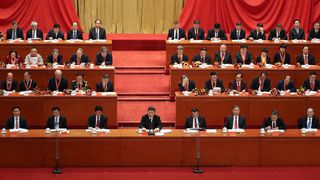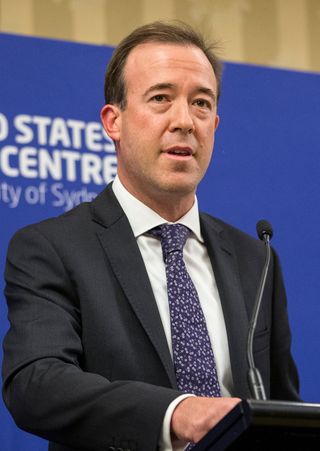When the outgoing Trump administration unexpectedly declassified its “top-secret” Strategic Framework for the Indo-Pacific last month, some Australian commentators quickly claimed credit for Canberra’s influence in shaping a tougher US-China policy.
Their judgment appeared rewarded when Axios quoted a former senior US official saying that Australia was “ahead of the curve” in understanding Chinese influence operations and domestic interference. Indeed, Canberra was elevated as the “pioneer” in awakening American eyes to the China threat.
That document represented the view of the Republican “adults”. Trump, then distracted by aftershocks of the Capitol riot, couldn’t squabble over who deserved credit for the policy. So his former National Security Adviser HR McMaster claimed it.
This designation of Australia’s pioneering role raises several significant questions.
Canberra was not only singled out but thanked for being at the vanguard of “pushing back” against China, even though the Trump administration already was well aware of the threat China posed on coming to office in January 2017.
The first is that it overturns the more traditional critique of Australian-American relations, which habitually portrays Canberra in obsequious genuflection to its great power protector.
In this case, Canberra was not only singled out but thanked for being at the vanguard of “pushing back” against China, even though the Trump administration already was well aware of the threat China posed on coming to office in January 2017.
The second is that, viewed generously, it could be seen to fulfil Canberra’s original vision for how the alliance was meant to work – namely that Australia should be heard at the top table of American policymaking.
When ANZUS was negotiated in 1951, then minister for external affairs Percy Spender pushed hard for access to America’s global policy planning processes. He did so out of the painful experience with Britain in the 1930s and 1940s, knowing that great powers played fast and loose with Australia’s distinctive Pacific interests.
Washington was loath to give Australia such access. And it didn’t. So Spender knew that the effort to influence US policy would have to be continuous. It meant, as historian David McLean argued, that “the alliance encouraged the habit of regarding American protection as the ultimate goal of Australian foreign policy”.
Thus, in Vietnam, Australia was not dragged in reluctantly but rather pressed the Americans to continue the fight.
Likewise, the effort now to be ahead of the Americans on China is in part designed to convince Washington that because Canberra now squats in the dugout of the “new Cold War”, it cannot possibly abandon its ally at this anxious hour.
But this betrays the unspoken fear in Canberra’s sometimes suffocating alliance embrace: that America’s resolve to remain the regional hegemon might be wavering. As Sam Roggeveen points out in the latest Australian Foreign Affairs, there hasn’t been a “dramatic migration of US military forces to the Pacific” commensurate with Washington’s talk of “Cold War II”.
Notwithstanding the genuine fiscal pain felt by barley and wine exporters, the Australian economy has not yet borne heavy costs for leading the China “pushback”. Amid the trade war tumult, the Australian Bureau of Statistics says exports to China have shown “steely resolve”.
Notwithstanding the genuine fiscal pain felt by barley and wine exporters, the Australian economy has not yet borne heavy costs for leading the China “pushback”. Amid the trade war tumult, the Australian Bureau of Statistics says exports to China have shown “steely resolve”. Some of the coal China rejected has gone instead to India, Thailand and Vietnam.
Nevertheless, it might still be asked, given the political deep freeze in which the relationship appears stuck, how and why Australia adopted this posture. And crucially, what it stands to gain from it.
Senior Australian officials in 2017 were already expecting that Australia could, like South Korea, expect Chinese economic coercion to come their way.
‘Political warfare’
At one end of the scale, some spoke of a need to unleash “political warfare” on Beijing as a means of publicly calling out China’s bad behaviour. The intention? To send the message that Canberra knew what Beijing was playing at, that it was not about to cop what the regime was doing to its own people: namely accept economic benefits in exchange for political compliance.
Others began to talk of a contest for ideas in Asia, of Canberra having to strike a balance between Australian political independence and its future prosperity.
Another line being advanced at that time – less ideological yet no less forward-leaning – was that the government would have to find an equilibrium in its China policy through a mix of push and shove. That meant laying down markers. That’s probably the closest explanatory framework for understanding China policy here over the past four years.
This evolution of Australia’s China policy awaits sustained investigation. Understanding how it took root is surely one key to charting any kind of new path forward, which new Trade Minister Dan Tehan is clearly trying to do in a recent letter to his Chinese counterpart.
But just what shelf-life this “pioneering” Australian China policy has remains to be seen.
Based on his earliest actions – inviting the most senior Taiwanese representative to the inauguration, continuing arms sales to Taiwan and delaying high-level talks with China until such time allies are consulted – US President Joe Biden hardly looks to need Australia as a guide. American analyst Walter Russell Mead has said these constitute the “most aggressive concatenation of moves against a foreign power that any peacetime US administration has ever launched so early on”.
Some in Canberra will see it as vindication for Australia’s stance. And it does seem clear that momentum for co-ordination with others in pushing back against Beijing, such as with Japan in the East China Sea, is only building.
But it’s also not clear that, should more serious costs eventuate from continued Chinese coercion, America can throw much Australia’s way if it is still bunkered down in its dugout, shouting.
That’s not an argument for retreat, but it is a call to make Australian diplomacy and statecraft less tethered to alliance management and mobilised much more smartly to prosecute the nation’s distinctive interests in this part of the world.






